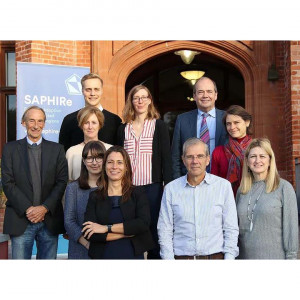 \
&
Contact us
\
&
Contact us
 \
&
Contact us
\
&
Contact us
Published on | 1 year ago
Programmes ERC RI MSCA FET Widening SwafSThe study presents lessons learned and recommendations for policy on excellent science under Horizon 2020. This is one of several support studies feeding into the European Commission's ex-post evaluation of the European framework programme for Research and Innovation Horizon 2020.
This evaluation study, performed in line with the Better Regulation Guidelines, serves as an input into the ex-post evaluation of Horizon 2020, the EU framework programme for Research and Innovation 2014-2020. Horizon 2020 was adopted in the context of the Europe 2020 Strategy, and was designed to drive economic growth and create jobs by coupling research and innovation (R&I), with an emphasis on excellent science, industrial leadership and tackling societal challenges. This study assesses the overall contribution of Horizon 2020 to excellent science across the framework programme with a particular focus on the activities under Pillar 1, Excellent Science (i.e. the European Research Council (ERC), Marie Skłodowska-Curie Actions (MSCA), European research infrastructures (INFRA), and Future and Emerging Technologies (FET)), as well as the horizontal pillars Spreading Excellence and Widening Participation (SEWP) and Science with and for Society (SwafS). The study builds on the Horizon 2020 intervention logic and relies on a wide range of methods. These include (but are not limited to) desk research, a broad-scope interview programme, 15 case studies and four international benchmark studies, a survey programme, a bibliometric analysis, econometric modelling, and the analysis of (unstructured and EC monitoring) data. The findings of the study respond to a set of evaluation questions covering the five evaluation criteria: relevance, coherence, efficiency, effectiveness and EU added value. This study places a stronger focus on the key findings, conclusions and recommendations in relation to efficiency, effectiveness and EU added value, as the other evaluation criteria are analysed in greater depth by other ongoing studies. (from the executive summary)
We offer news and event updates, covering all domains and topics of Horizon Europe, Digital Europe & EDF (and occasionally, for ongoing projects, Horizon 2020).
Stay informed about what matters to you.
By signing up, you can opt in for e-mail notifications and get access to
a personalised dashboard that groups all news updates and event announcements in your domain(s).
Only for stakeholders located in Flanders

The Department of Economy, Science and Innovation of the Flemish government coordinates the Horizon 2020 Coordination and Support Action SAPHIRe, which started on 1 December 2018. The aim of the project is to secure the adoption of personalised medicine in all European regions, including sparsely populated and remote regions and regions with different innovation capacities.
The activities of SAPHIRe are complementary to the smart specialisation partnership on personalised medicine – S3P4PM, which is also coordinated by the Department of Economy, Science and Innovation.